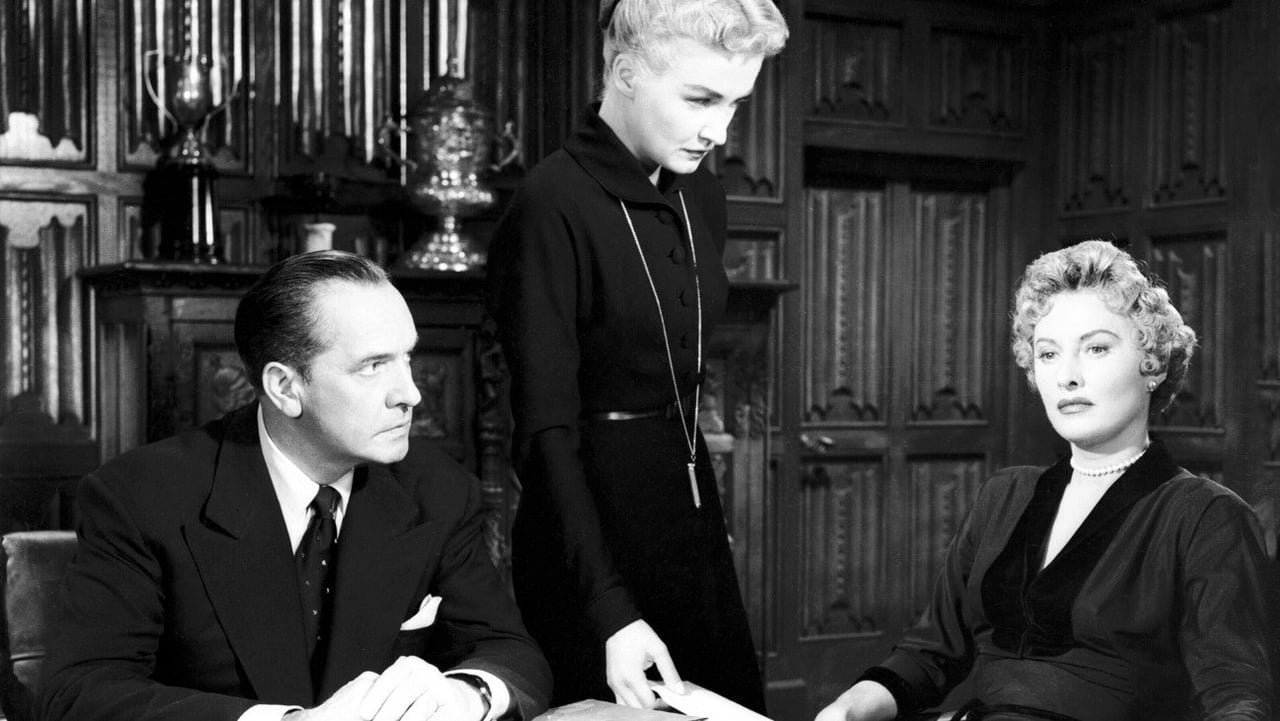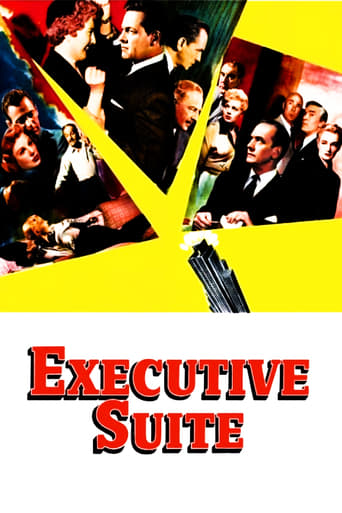

High class corporate intrigue/soap opera with an outstanding cast. Wise once again proves his dexterity with most any genre by steering this somewhat stagy drama smoothly over the hurdles.He's aided by a great cast that could have only been pulled together by one of the top studios during its peak years. As the main couple William Holden and June Allyson are surprisingly simpatico as the idealistic young husband and wife whose happy home life and future are suddenly jeopardized by an unexpected turn of events. His intense, reactionary temperament and her sunny, somewhat quivery rectitude on the surface would seem an odd fit but instead they come across as a long married couple whose differences only strengthen their union. As far as the other men go, Fredric March and Louis Calhern are interesting contrasts as two kinds of opportunist. March a resolute, basically principled bean counter who allows his ambition to compromise his integrity and Calhern a profligate heel who miscalculates at the wrong moment. Walter Pidgeon's character doesn't get to do much but be exasperated at different people and on the phone, he's more of a plot device to move the story forward. To a lesser extent the same is true of Paul Douglas' harassed salesman but he does get a couple of chances to flesh out his character in his interactions with Shelley Winters.Considering this is a 50's boardroom narrative it's nice to see several decent women roles included besides June's. Barbara Stanwyck as befits her star status gets the juiciest role, even if it is limited in actual screen time. At first her big emotional outburst seems overdone until you realize it's decades of frustration and pain she's pouring out, the rest of the time she cool and classy. Shelley Winters' secretary has a vulnerability not common in her work but she plays it well. That leaves Nina Foch, an excellent actress and she's fine as the dutiful executive secretary but she was Oscar nominated for this and that's a puzzler. Of all the parts in the picture hers is the lest fleshed out. She's a steadying force but nothing else, we learn nothing of her and she doesn't make much of an impact on the flow of the film.Similar in structure to Patterns, The Power and the Prize and the much glossier Women's World if you like films about power struggles and the backstage machinations involved with them you're sure to find this enjoyable.
... View MoreOne thing you an always count on from Hollywood is its innate ability to destroy reality (or history) to make an entertaining show. That's what movies are all about. Look at what they did to Robert Stroud, the Birdman of Alcatraz, who ends up being a nice guy. Hitler had the more appealing personality. Or take any war/battle film. Reality simply doesn't provide enough juicy events to satisfy Hollywood's demands, so it simply makes them up. This is especially effective when the subject (like that in this film) is beyond the experiences of the audience. They'll believe anything, so that's exactly what they get. And I'd sure like to know how Tredway manages to manufacture anything using non-union workers. And believe you me, that crap about workers disappointed in the quality of their products was one complaint I've never heard coming out of a union hall. The idea that all big businesses are alike is a claim made only by the ignorant. Businesses are as different as the folks who run them, which is actually what defines the business. There are really well run companies and (at least for awhile) really poorly run outfits. Only those whose small minds can only handle simple ideas think that big business can be stereotyped. I should know, and they are ALL different, except that those that survive are either lucky or smart. The really good ones are both.
... View MoreI watched this movie this weekend, found it very timely but naive.Warning: spoiler.In the movie, the salesholes don't take over and run the company into the ground. In reality...read the papers.Growth used to be a consequence of something more fundamental, like excellence, innovation, intelligently taking on risk(not shedding it onto someone else)and successfully running uphill. The mantra coming out of American Business Schools for decades has been 'Grow or Die.' As soon as growth became the primary goal and not a consequence of something more fundamental, those once causes of growth became cost centers, to avoid. You don't spend money on R&D for growth five years down the road if it is at the expense of growth of this year's -- this quarters' 'growth' numbers. If 10 million spent on PR fluff buoys this quarter's numbers more than 10 million spent on R&D, then guess who is going to spend 10 million simply telling us how great that car is, the one that is leaking oil all over our garage floor.HP is an example. It once grew because its founders were excellent, and their products were the Gold standard of instrumentation. HP also grew under the Carly generation, but it was all about the Excel, and not so much about the excellence. Look at the difference between the plastic toner carriers they sell today, and the last tank that the old HP manufactured, the LaserJet IIP, etc. in the 90s. Huge toner cartridges, metal chassis tanks, both designed to last forever. The Carly generation got out its MBA Excel, and added an entry for 'how small can we make the ink cartridges and not lose enough customers to make up for the increase in cartridge revenue?' How awful can we make these plastic printer/cartridge consumption platforms and still have folks grit their teeth and buy them? I'm not saying there is no such thing as excellence today. I am saying, we're out of balance. Too much Excel, not enough excellence. Companies cut all these corners these days because they are carrying way too much high priced deadwood around, like this was still post WWII America of the fifties, and we could all still just phone it in.
... View MoreAs most other reviewers, I found this a delightful watch; all the actors are right on and the story is gripping. But I am amazed by the number of reviewers who labor under the notion that this is a film about "big business." Given the numbers of the shares of stock and their prices, even at 1954 rates, this is quite a small business and most of the shares are closely held (by the daughter of the founder); it's puzzling how the SEC would permit the shares of such a business to be publicly traded. It's also puzzling how the profits of such an outfit could support the salaries of the executives/board members shown in the film. In this respect, this film is similar to Cash McCall, based on a novel by the same author,where the business involved is tiny compared to the scale of, e.g., the top thousand American corporations by any measure, sales, capitalization, etc.
... View More